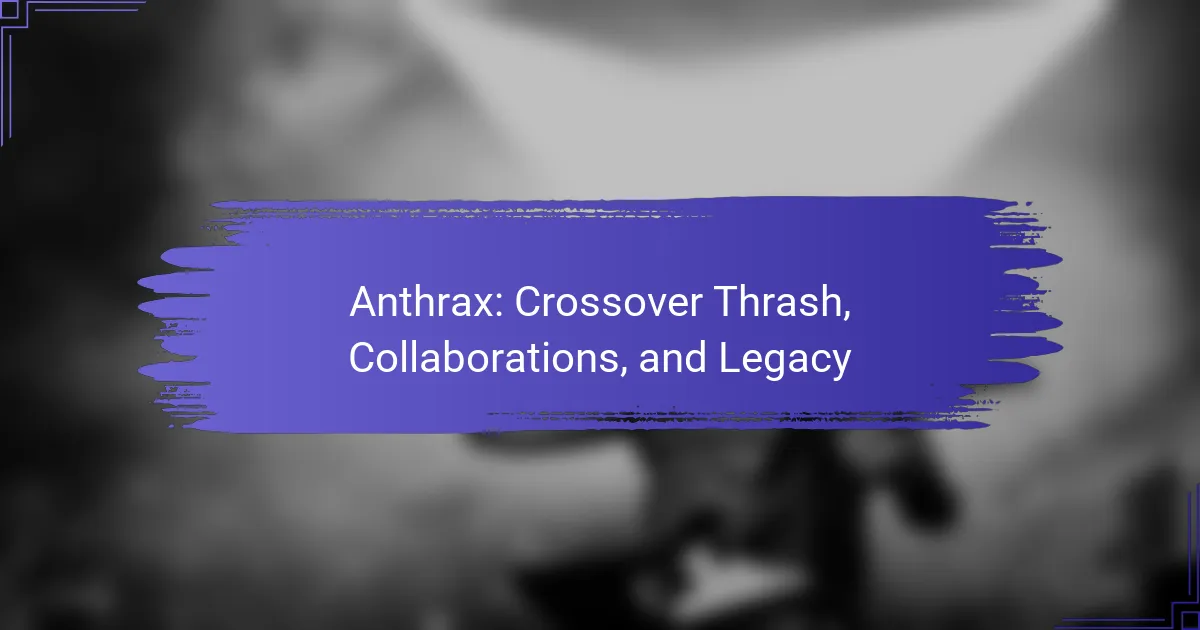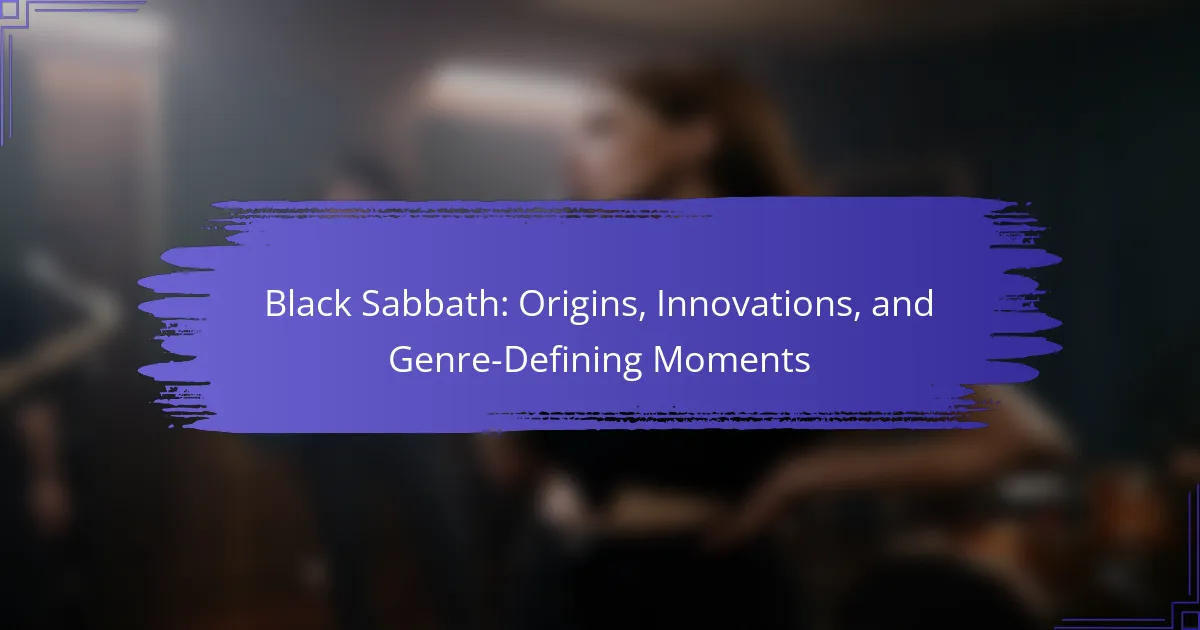AC/DC’s music is a cornerstone of rock anthems, known for its electrifying energy and timeless appeal. The article explores their powerful live performances, cultural significance, and the themes of rebellion and freedom in their lyrics. It also addresses common misconceptions about the band’s depth and influence, highlighting their unique sound and legacy in rock history.
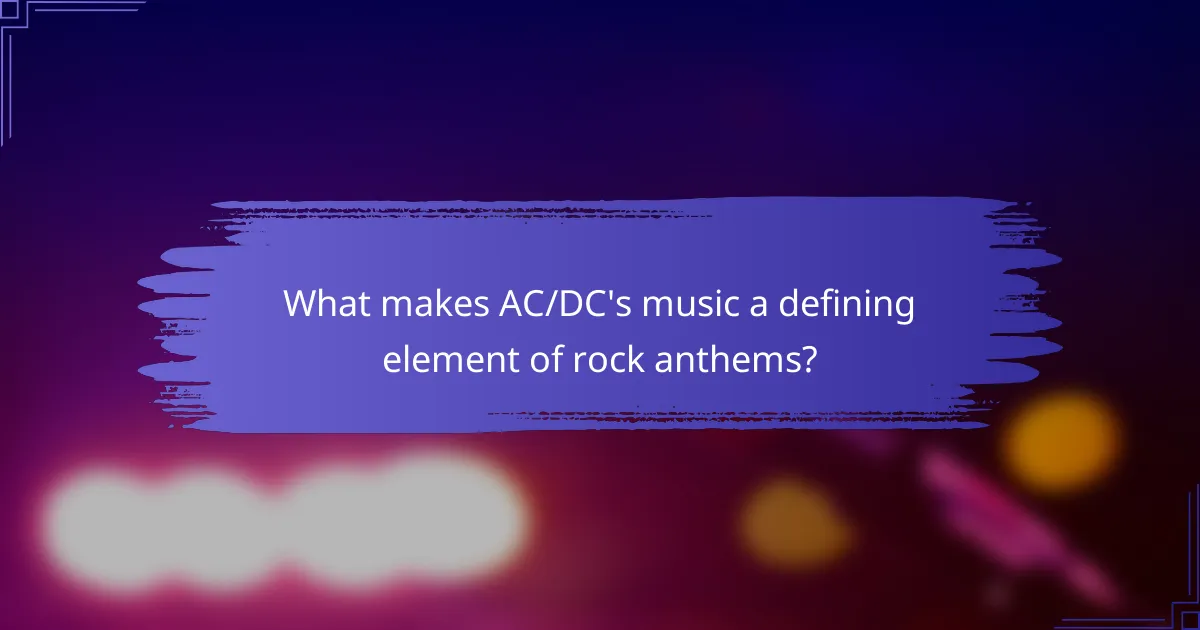
What makes AC/DC’s music a defining element of rock anthems?
AC/DC’s music is a defining element of rock anthems due to its electrifying energy and timeless appeal. Their powerful guitar riffs and anthemic choruses resonate with audiences, creating an unforgettable live experience. The band’s ability to blend hard rock with catchy melodies has set a standard for rock music since the 1970s. Their iconic tracks, such as “Back in Black” and “Highway to Hell,” exemplify the essence of rock anthems, characterised by their rebellious spirit and sing-along quality. AC/DC’s cultural significance is further underscored by their influence on countless artists and genres, solidifying their legacy in rock history.
Which songs are considered the most iconic in AC/DC’s discography?
AC/DC’s most iconic songs include “Back in Black,” “Highway to Hell,” “Thunderstruck,” “You Shook Me All Night Long,” and “T.N.T.” These tracks showcase the band’s signature sound and have significantly influenced rock music. “Back in Black” remains one of the best-selling albums, highlighting its cultural impact. “Highway to Hell” is often recognised as an anthem of resilience and rebellion, while “Thunderstruck” is celebrated for its electrifying guitar riffs and live performance energy. Each song contributes to AC/DC’s legacy as rock legends.
How does AC/DC’s sound influence modern rock music?
AC/DC’s sound has profoundly shaped modern rock music by defining hard rock’s core elements. Their powerful guitar riffs and energetic rhythms set a standard for bands seeking to capture raw energy. The band’s influence is evident in the heavy guitar-driven style of contemporary rock artists, who often cite AC/DC as a key inspiration. Their anthemic songwriting and live performance energy continue to resonate, encouraging a focus on crowd engagement and high-octane shows. This legacy ensures that AC/DC’s sound remains a touchstone for aspiring musicians in the genre.
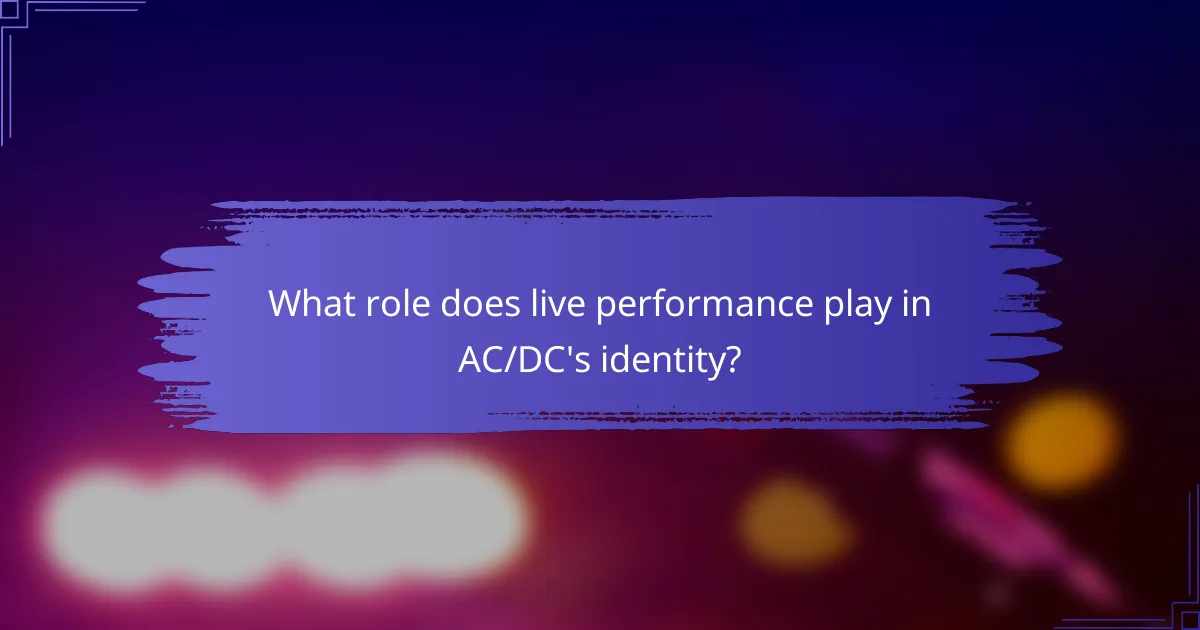
What role does live performance play in AC/DC’s identity?
Live performance is central to AC/DC’s identity, embodying their raw energy and connection with fans. Their concerts are legendary for electrifying atmosphere, showcasing powerful guitar riffs and anthemic vocals. This live energy reinforces their reputation as rock icons and enhances their cultural significance. AC/DC’s unique ability to engage audiences during performances distinguishes them in the music industry, making each show an unforgettable experience. Their commitment to high-octane live shows has solidified their legacy as one of the greatest rock bands of all time.
How has AC/DC’s stage presence evolved over the years?
AC/DC’s stage presence has evolved significantly, showcasing increased energy and theatricality. Initially, their performances focused on raw rock energy, characterised by Angus Young’s iconic schoolboy outfit and high-voltage guitar solos. Over the years, they incorporated elaborate stage setups, dynamic lighting, and visual effects, enhancing the overall concert experience.
Their unique ability to engage audiences has remained consistent, with memorable moments like Angus’s signature duck walk and Brian Johnson’s powerful vocals. The band’s commitment to live performance has solidified their cultural significance, making them one of the most recognised rock acts globally. As a result, AC/DC’s stage presence continues to resonate with fans, blending nostalgia with modern concert expectations.
What are the key elements of an AC/DC concert experience?
An AC/DC concert experience is defined by electrifying performances, iconic rock anthems, and a vibrant atmosphere. The band’s high-octane energy captivates fans, creating an unforgettable live music event. Key elements include powerful guitar riffs, engaging stage presence, and audience interaction. The cultural significance of AC/DC enhances the concert, as fans celebrate rock heritage together. Unique attributes like elaborate stage setups and signature outfits further elevate the experience, making each concert a memorable celebration of rock music.
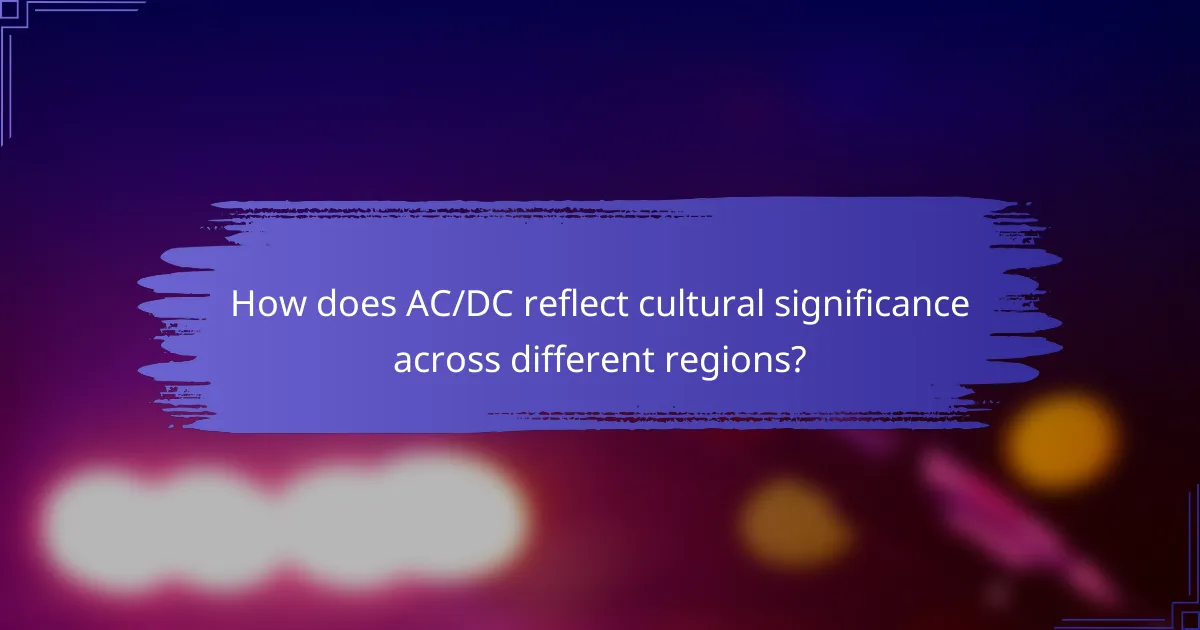
How does AC/DC reflect cultural significance across different regions?
AC/DC embodies cultural significance through its universal themes and high-energy performances, resonating across diverse regions. The band’s anthems often address rebellion, freedom, and rock ‘n’ roll spirit, appealing to various audiences worldwide. For instance, in Australia, AC/DC is a symbol of national pride, while in Europe, their music reflects a countercultural movement. Their unique sound, characterised by powerful guitar riffs and energetic vocals, transcends language barriers, making them a global rock icon. The band’s influence is evident in local music scenes, inspiring countless artists and fostering community through shared musical experiences.
In what ways has AC/DC impacted youth culture and rebellion?
AC/DC has significantly influenced youth culture and rebellion through their electrifying music and bold persona. Their anthems, characterised by themes of freedom and defiance, resonate with young audiences seeking empowerment. The band’s high-energy performances create a sense of community among fans, fostering a rebellious spirit.
AC/DC’s unique sound, blending rock and roll with hard-hitting riffs, has become synonymous with youth rebellion since the 1970s. Songs like “Highway to Hell” and “Back in Black” serve as rallying cries, encouraging listeners to embrace individuality and challenge societal norms. This cultural impact is evident in various youth movements and subcultures that adopt AC/DC’s music as a soundtrack for resistance and self-expression.
Moreover, the band’s unapologetic attitude and iconic imagery, such as schoolboy uniforms and devil horns, reinforce their status as symbols of rebellion. Their influence extends beyond music, inspiring fashion trends and attitudes that celebrate nonconformity. As a result, AC/DC remains a pivotal force in shaping the identity of youth culture and the spirit of rebellion across generations.
How do regional perceptions of AC/DC’s music differ?
Regional perceptions of AC/DC’s music vary significantly, influenced by cultural contexts and historical backgrounds. In Australia, AC/DC is celebrated as a national icon, embodying the spirit of rock and roll. Their music reflects local themes and resonates deeply with Australian identity. In contrast, in the United States, AC/DC is often seen as a quintessential hard rock band, admired for their high-energy performances and guitar-driven sound. This perception emphasises their influence on the rock genre and their role in shaping the music scene. In Europe, especially in the UK, AC/DC’s music is appreciated for its rebellious spirit and classic rock roots, often associated with the broader rock movement of the 1970s and 1980s. These regional differences highlight how AC/DC’s music transcends borders, adapting to various cultural landscapes while maintaining its core identity.
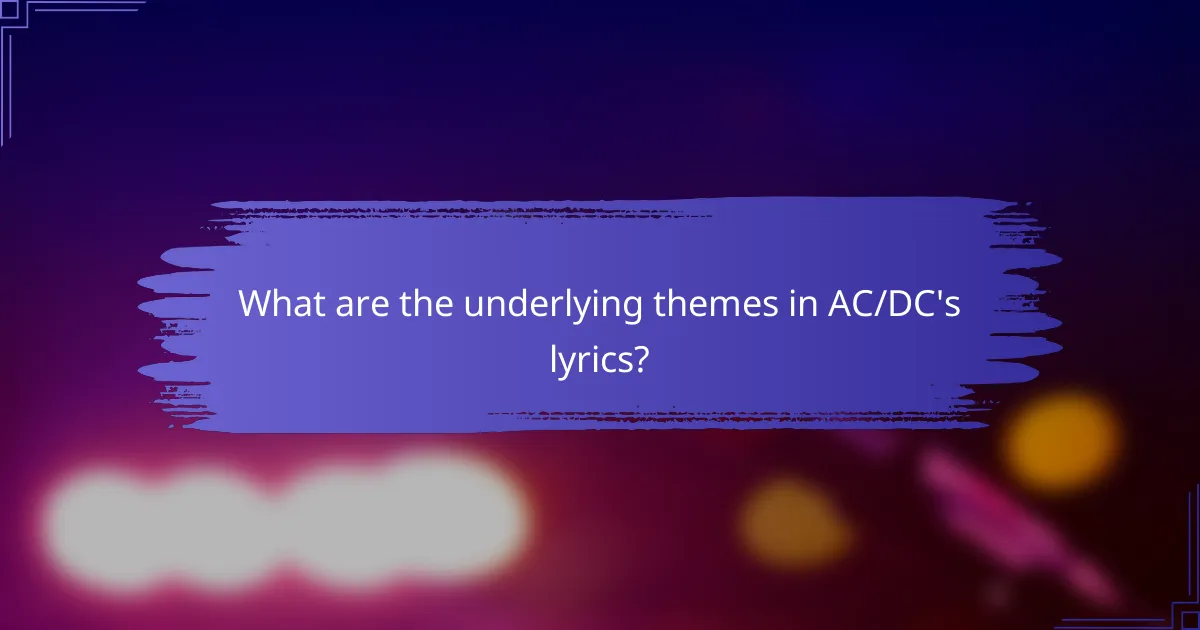
What are the underlying themes in AC/DC’s lyrics?
AC/DC’s lyrics often explore themes of rebellion, youthful exuberance, and the rock and roll lifestyle. Their songs emphasise freedom and defiance, showcasing a unique attribute of celebrating life’s raw energy. The cultural significance of their anthems lies in their ability to resonate with audiences seeking empowerment and escape. For example, tracks like “Highway to Hell” and “Thunderstruck” encapsulate the essence of rock music, reinforcing the band’s legacy in popular culture.
Which social issues are addressed in AC/DC’s songs?
AC/DC’s songs address various social issues, including rebellion against authority, the struggles of working-class life, and themes of freedom. Their lyrics often reflect a raw, unfiltered perspective on societal challenges. For example, songs like “Highway to Hell” symbolise a defiance against societal norms, while “Dirty Deeds Done Dirt Cheap” critiques moral ambiguity in business. These themes resonate with listeners, highlighting the band’s cultural significance in rock music.
How does AC/DC’s lyrical content resonate with fans worldwide?
AC/DC’s lyrical content resonates with fans worldwide due to its themes of rebellion, freedom, and rock ‘n’ roll lifestyle. The band’s anthems, characterised by straightforward and powerful lyrics, evoke a sense of camaraderie among listeners. Fans appreciate the energetic delivery and relatable messages that celebrate life and defiance. This emotional connection fosters a strong global community, uniting diverse audiences through shared experiences and values.
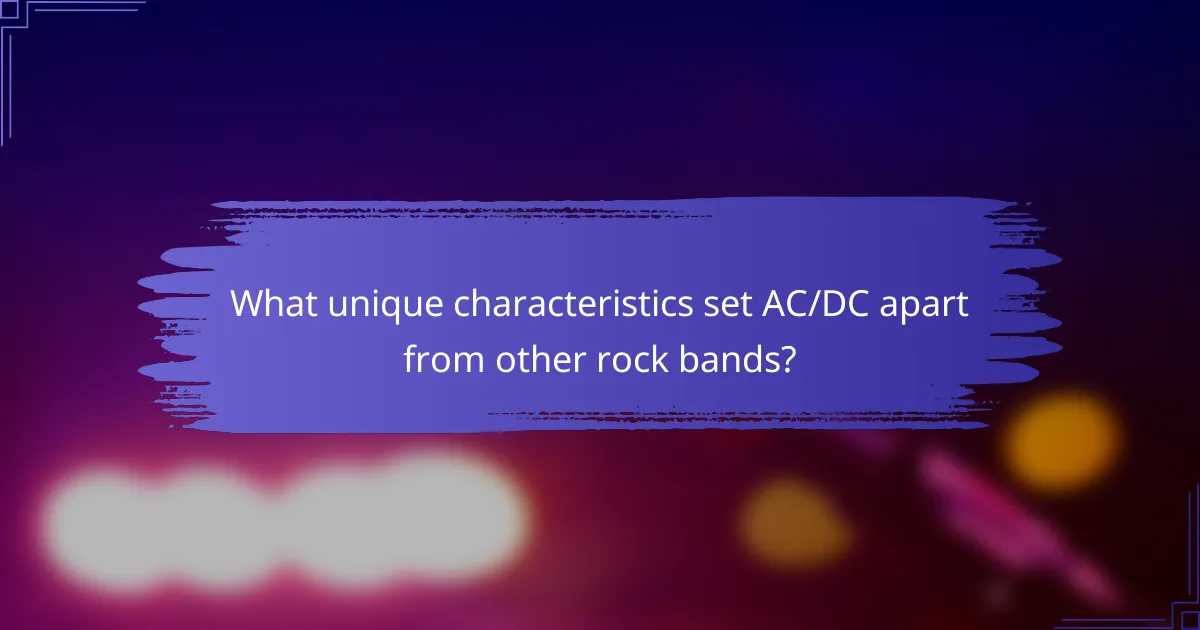
What unique characteristics set AC/DC apart from other rock bands?
AC/DC stands out due to their electrifying live performances, distinctive sound, and cultural impact. Their signature blend of hard rock and blues creates a powerful musical identity. Unique attributes include their consistent use of high-energy anthems and a focus on themes like rebellion and rock ‘n’ roll lifestyle. Additionally, their iconic guitar riffs and the distinctive vocal style of Brian Johnson set them apart from other bands. AC/DC’s influence on rock music and their ability to connect with audiences globally solidify their legendary status.
How does AC/DC’s approach to songwriting differ from peers?
AC/DC’s songwriting emphasises straightforward, high-energy riffs and anthemic choruses, setting them apart from peers. Their approach focuses on simplicity and directness, often avoiding complex structures. This unique style creates a distinctive sound characterised by powerful guitar work and memorable hooks, appealing to a broad audience. While many bands experiment with intricate arrangements, AC/DC maintains a consistent formula, prioritising live performance energy and audience engagement. This commitment to a raw, unrefined rock ethos solidifies their cultural significance in the music industry.
What rare collaborations or projects have featured AC/DC members?
AC/DC members have participated in several rare collaborations and projects. Notable examples include Brian Johnson’s work with Paul McCartney on “The Fireman” project and Angus Young’s collaboration with the band The Good, The Bad & The Queen. Additionally, members have contributed to charity albums, such as “Band Aid” and “Hear ‘n Aid,” showcasing their commitment to social causes. These collaborations highlight their versatility and influence beyond traditional rock music.
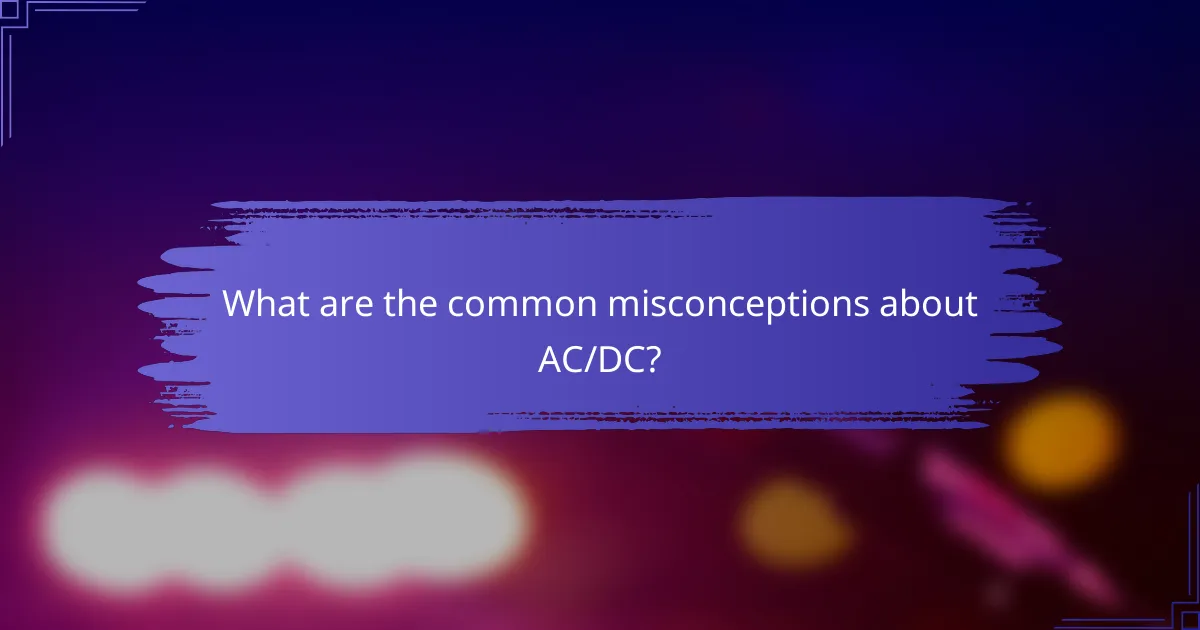
What are the common misconceptions about AC/DC?
Common misconceptions about AC/DC include the belief that their music lacks depth, that they are merely a party band, and that their success is solely due to marketing. In reality, AC/DC’s music showcases intricate guitar work and powerful lyrics that resonate with themes of rebellion and freedom. Their live performances are legendary for their energy and engagement, reflecting a deep connection with fans. Additionally, AC/DC’s influence on rock music and culture is profound, extending beyond mere commercial success to inspire countless artists.
Why do some critics overlook AC/DC’s musical complexity?
Critics often overlook AC/DC’s musical complexity due to their straightforward rock sound and energetic performances. The band’s signature style emphasises powerful riffs and catchy hooks, which can mask intricate musical arrangements. Additionally, their consistent formula may lead some to underestimate the underlying musicianship. AC/DC’s ability to craft memorable anthems contributes to their cultural significance, yet this focus can detract from an appreciation of their artistic depth.
What are the most frequent myths surrounding the band?
Many myths surround AC/DC, often distorting their image and impact. One common myth is that the band glorifies violence and rebellion; however, their lyrics often celebrate freedom and rock culture. Another myth suggests that AC/DC’s success is solely due to shock value, while their musical craftsmanship and energetic performances have been pivotal. Additionally, some believe the band has a dark or sinister image, but their humour and camaraderie shine through in their work. Lastly, the misconception that AC/DC’s music lacks depth overlooks the emotional and personal themes present in many of their songs.
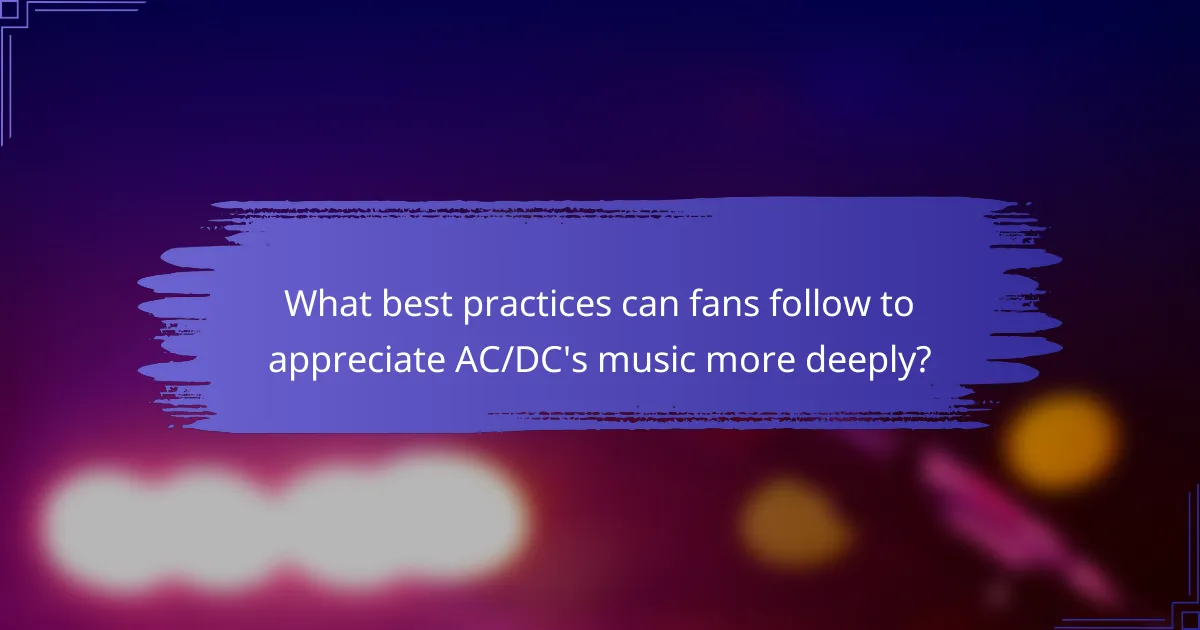
What best practices can fans follow to appreciate AC/DC’s music more deeply?
To appreciate AC/DC’s music more deeply, fans should engage with their albums, attend live performances, and explore the band’s history. Listening to the distinct guitar riffs and powerful vocals enhances the understanding of their rock anthems.
Studying the lyrical themes reveals cultural significance, often centred around rebellion and freedom. Fans can also connect with the community through fan clubs and online forums, sharing insights and experiences. Analyzing live performances showcases their unmatched energy, which is a unique attribute of their concerts.
Finally, revisiting classic albums like “Back in Black” and “Highway to Hell” allows fans to recognise the evolution of their sound and impact on rock music.
How can listeners discover lesser-known AC/DC tracks?
Listeners can discover lesser-known AC/DC tracks through streaming services, live recordings, and fan compilations. Platforms like Spotify and Apple Music often feature hidden gems in their playlists. Additionally, exploring bootleg recordings can reveal unique performances. Engaging with fan communities on social media and forums can also provide insights into rare tracks and live versions.
What tips can enhance the live concert experience for fans?
To enhance the live concert experience for fans, focus on preparation, engagement, and atmosphere. Arrive early to secure a good spot and soak in the energy. Engage with fellow fans to build excitement and share experiences. Embrace the atmosphere by dressing in band merchandise and participating in sing-alongs. Capture moments through photos, but avoid excessive distractions. Lastly, appreciate the cultural significance of the performance, as AC/DC’s impact on rock music is profound.

